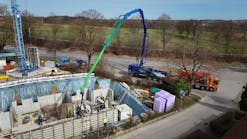IPAF 2025 Campaign Targets MEWP Overturns
The International Powered Access Federation (IPAF) 2025 Global Safety Campaign focuses on the consequences of mobile elevating work platform (MEWP) overturns. These incidents can result in operators and occupants being ejected from the platform and create complex rescue scenarios for those trapped at height during a partial overturn.
More on safe lifting
- Best practices for telehandler safety.
- St. Petersburg calls for state crane standards.
- Court rules on men who parachuted off crane.
- OSHA cites two firms in crane fatality.
“Stop Overturns—Safety Starts on the Ground!” is a response to data from the IPAF Accident Reporting Portal. The latest statistics revealed that:
- Fatal overturns increased by 50% from January 2021 to December 2023.
- In the last decade, 108 fatalities, 64 major injuries, and 25 minor injuries, were reported and attributed to overturns incidents involving MEWPs. 64% of overturns were reported from North America, 18% from Europe, and 22% from Asia.
- The occupation most affected was MEWP operators, with a small number from delivery drivers, technicians/engineers, company staff and the public.
- Of these 108 recorded fatalities, 52 were recorded in 2021-2023, and 33% of overturns happened on a 3A mobile scissor, followed by 1B static boom (28%), 3B mobile boom (23%) and 1B static boom (12%).
- Instability leading to overturn is commonly among the top four industry causes of lost time incidents (LTIs) annually.
- MEWP overturns typically occur during setup, travel, or operation on inadequate or unsuitable ground or floor conditions. They can also occur while moving category 3A and 3B MEWPs across unsuitable terrain in either the elevated or stowed positions.
- The most common places for incidents to occur are construction premises, public areas, roads and highways, and rental yards.
- Non-fatal injury types result in fracture, concussion, bruising, impact pains, and cuts and lacerations.
“MEWP overturns continue to be a major cause of serious injuries and fatalities in our industry,” said Brian Parker, head of safety & technical, in a statement. “With the launch of IPAF’s 2025 Global Safety Campaign—Stop Overturns: Safety Starts on the Ground!—we are reinforcing a crucial message: Ground conditions matter. By understanding the risks and implementing proper safety measures, we can prevent overturns, protect lives, and create safer work environments worldwide.”
Joining Parker in leading the campaign is Alana Paterson, head of health, safety & environment at Taylor Woodrow and chair of the IPAF International Safety Committee.
IPAF has developed new industry guidance: The Assessment of Ground Conditions and Supporting Structures for The Safe Use of MEWPs. It is split into two parts. Guidance for MEWP users includes sections on dewatering, suspended floors, and temporary works. Guidance for MEWP operators focuses on the MEWP travelling on uneven ground, elevated, stowed position, slopes, and positioning.
Other guidance in the overturns global safety campaign includes:
- A risk assessment should be conducted during the planning phase. This must include evaluation of the ground/support structures that MEWPs are to be positioned or travelled on to ensure they are safe.
- A MEWP pre-use inspection should be carried out by the operator prior to each use.
- A ground assessment should be made by the operator prior to each use of the MEWP.
- Walk the route: if a MEWP is to travel from one area to another, the operator should identify potential hazards by walking the route prior to MEWP operation.
- MEWP maintenance: owners should keep MEWPs in a safe-to-use condition in accordance with manufacturer’s specifications and industry standards.
- Quality operator training: employers should ensure all their operators are adequately trained, familiarized.

Rod Sutton
Sutton has served as the editorial lead of Construction Equipment magazine and ConstructionEquipment.com since 2001.
Our mission is to help managers of heavy equipment and trucks to improve their performance in acquiring and managing their fleets. One way we do that is with our Executive Institute, where experts share information and ideas that will enable equipment managers to accurately manage equipment costs so that they can deliver the optimum financial benefits to their organizations.
We also have a laser focus on product development, performance, and technology; as well as equipment acquisition, disposal, and maintenance. Our exclusive Field Tests take earthmoving equipment and truck into the field for professional evaluations.
Check out our free newsletters to see the latest content.
You can find Sutton on LinkedIn.





